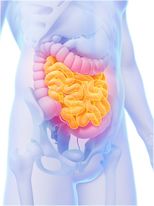|
If you’ve dealt with a skin condition, such as acne or eczema, you’ve probably tried a series of different skin regimens to help improve your skin. I know what it’s like. I’ve been there, struggling with eczema, which ultimately led me to a career change from biochemical research to naturopathic medicine. You see, no matter how much I diligently used my cortisone creams and moisturizers, it kept coming back, and I knew I needed to look deeper for the answers. I found the answers were not merely skin deep. The answers were in my gut!
Naturopathic medicine has long taught that skin conditions need to be addressed through the health of the gut, and that the gut and the skin are intimately connected. When you think about it, the inside of your digestive system is like an internal continuation of your external skin. We now know that a huge part, about 80%, of your immune system lies in your gut, and that many skin conditions are associated with a dysregulation of the immune system. Your gut is your first line of defense against pathogens, and regulates your immune system’s response to different foods, toxins, and micro-organisms. To have healthy skin from the inside out, you must first address the health of your gut! This is primarily how I address skin conditions in my practice, from the inside out, and I have seen great improvements in my patients’ skin conditions using this approach. Skin Conditions Associated With Digestive Issues If the link between digestive issues and skin conditions is real, we would expect to see a strong correlation between digestive diseases and skin conditions. And we do see this. For example: -Acne rosacea, an inflammatory condition of the skin on the face, is associated with a higher prevalence of gastrointestinal complaints (including Celiac disease, Crohn’s Disease, Ulcerative Colitis, H. pylori infection, Small Intestinal Bacterial Overgrowth (SIBO), and Irritable Bowel Syndrome (IBS)) than in the general population (Egeberg et al., 2017). -Eczema and other rashes have been associated with reactions to certain foods, including in a condition called Non-Celiac Gluten Sensitivity (Elli et al., 2015). -Dermatitis herpetiformis is a skin condition found in ¼ of patients with Celiac disease (Kresser, 2012) The Leaky Gut, Leaky Skin Connection We now know that chronic inflammation and damage to the gut lining can lead to a state of intestinal hyperpermeability, where food particles and microbial toxins that shouldn’t get through do get through, leading to what we call a “leaky gut”. This damage could happen as a result of many things, including food sensitivities, genetically modified foods, an imbalance in gut flora (the microbes in the gut), infections, and chronic stress. Many of these things worsen skin conditions as well. Stress not only impacts the gut barrier, it also makes the skin barrier more permeable, which is why you may experience a worsening of your skin condition when you are particularly stressed (Slominski, 2007). If the gut is leaky, this also influences the immunity of the skin, making it produce less protective anti-microbial peptides. Another aspect of the gut-skin connection, which I will address in a later blog, has to do with detoxification. If the gut, a primary organ of detoxification, is compromised, then the body will try and detoxify through other means, including the secondary detoxification systems, which includes the skin. Treating The Gut Improves The Skin Treating skin conditions definitely requires a multi-faceted approach. However, in my practice and in my own personal experience with eczema, I have seen a tremendous improvement in skin conditions by addressing the health of the gut first and foremost. For example, including probiotics in the diet, either through fermented dairy or through probiotics, can significantly improve the severity of acne vulgaris. Treating SIBO in a patient with acne rosacea is likely to improve their rosacea symptoms. Removing gluten in the diet usually resolves dermatitis herpetiformis. So why just stick to skin deep treatments when you can address the root cause(s) of your skin condition? Changing my diet and healing my leaky gut has been extremely important in helping me minimize my eczema. A similar approach has helped countless of my patients, and I’d love to help you too! References Egeberg A., Weinstock L.B., Thyssen E.P., Gislason G.H., Thyssen J.P. (2017). Rosacea and gastrointestinal disorders: a population-based cohort study. Br J Dermatol., 2017 Jan;176(1):100-106. doi: 10.1111/bjd.14930. Elli L., Branchi F., Tomba C., Villalta D., Norsa L., Ferreti F., Roncoroni L., Bardella M.T. (2015). Diagnosis of gluten related disorders: Celiac disease, wheat allergy and non-celiac gluten sensitivity. World J Gastroenterol., 2015 Jun 21;21(23):7110-7119.doi: 10.3748/wjg.v21.i23.7110 Kresser C. (2012). The gut-skin connection: how altered gut function affects the skin. Chris Kresser. Retrieved from: https://chriskresser.com/the-gut-skin-connection-how-altered-gut-function-affects-the-skin/ Slominski A. (2007). A nervous breakdown in the skin: stress and the epidermal barrier. J Clin Invest. 2007 Nov 1; 117(11): 3166–3169. doi: 10.1172/JCI33508
0 Comments
If you’ve been suffering from irritable bowel syndrome (IBS) and want to get to the bottom of your symptoms, there are some crucial tests that you may want to consider running through your naturopathic doctor. You’ve probably tried many different things already to help with your symptoms through trial and error, without significant or lasting relief. Testing eliminates much of the guesswork and helps us target our treatment so that you can get better faster!
During your initial visit with me, your medical history will give us a clue to what might be causing your symptoms. It could be one of the ones outlined in my previous blog. I’m giving you a list of the most common tests to consider, but most people only need to invest in one or two of these tests. By far, the most common test that I run with IBS patients is the first one, IgG Food Sensitivity Testing. 1) IgG Food Sensitivity Testing This is a blood test that measures levels of IgG antibodies to 120-200 foods, depending on which panel we run. It allows us to identify objectively which foods are the most likely to be causing the most inflammation in your digestive system. If we run this test, you will receive a printout of which foods you reacted to highly, moderately, or not at all. If you end up having a large number of reactive foods, you most likely have a condition called leaky gut, where the intestinal barrier becomes excessively permeable, leading to reactions to many foods. Repairing that leaky gut through naturopathic treatments can often allow you to eventually bring more foods back into your diet. 2) Candida IgG Test This is also a blood test, and can be added on to the IgG Food Sensitivity Test, or run on its own. It would be run if we suspect a yeast or Candida overgrowth which could contribute to IBS-like symptoms. If your results turn out positive, then we would treat the overgrowth with dietary changes and targeted supplements. 3) SIBO Breath Test Unlike the two tests above, this test is a breath test. You are given a lactulose solution to drink, and at timed intervals, take breath samples in the comfort of your home. The lactulose feeds bacteria in your intestine, and they will then produce hydrogen and/or methane gases as they break the lactulose down. These are the gases that are measured in your breath. If unusually high levels of those gases are found in your samples, you probably have Small Intestinal Bacterial Overgrowth (SIBO), a common cause of IBS. There is a multi-step process to treat SIBO, but the good news is that it CAN be treated! 4) Comprehensive Stool Analysis (+/- Parasitology) This test requires a stool sample, usually taken from 3 different bowel movements. It gives a comprehensive assessment of your digestive health, including which bacteria (beneficial and harmful) are present and their relative amounts, any yeast overgrowth, parasites, and other information on how well your digestive system is working. If we suspect parasites, this would be the test to run, but it can also be run if we suspect an imbalance in the beneficial bacteria in your digestive system, or if your digestive system is a mess. If you’ve been suffering from IBS symptoms for a while, testing could be a lifesaver, preventing you years of trial and error with different supplements and medications! Ready to start feeling better now? Book your initial visit with me today, and we’ll start investigating so that you can get to the bottom of your IBS. In health, Dr. Tamar Reference Image from 123RF.com  I am seeing more and more patients in my practice affected by autoimmune disease. Some of the more common autoimmune diseases I encounter are Hashimoto’s thyroiditis (a form of hypothyroidism), Graves' disease (a form of hyperthyroidism), Celiac disease (a strong intolerance to gluten), psoriasis (autoimmunity affecting the skin) and rheumatoid arthritis (autoimmunity affecting the joints). There are also some conditions that are not commonly thought of as autoimmune, but may have an autoimmune component and therefore fall on the autoimmune spectrum, including eczema and endometriosis. An interesting question to ask is: What do all these conditions have in common? What Is Autoimmunity? Autoimmunity literally means that your immune system is reacting to components of your own body as if they were foreign invaders! As your immune system develops during infancy, it is trained to differentiate self from non-self, so that it can accurately distinguish what can be harmful to you and what isn’t. Unfortunately, with autoimmunity, the immune system becomes confused and starts to attack self. The 3 Major Contributors To Autoimmune Disease Most people come and see a healthcare practitioner only after they have had symptoms of autoimmune disease for a while, making it difficult to pinpoint and study the origin of autoimmune disease. However, because of the growing incidence of autoimmune disease in North America, there has been more interest recently to study this in more depth. It has been found that there are 3 main triggers for autoimmune disease (Campbell, 2014; Ballantyne, 2013):
Various environmental factors can also trigger autoimmune disease. These include bacterial and viral infections (that result in the formation of autoantibodies because the bacteria or viruses’ proteins look similar to our own proteins), heavy metals, chemical toxicants, silicone breast implants, emotional stress, vitamin and nutrient deficiencies, and drugs (Campbell, 2014; Ballantyne, 2013; Myers, 2015). Last but not least of the 3 known triggers is a leaky gut (aka increased intestinal permeability). This is perhaps THE most important trigger. The current research suggests that leaky gut is a NECESSARY precursor to autoimmune disease! That means that, even if you have the genetic susceptibility and an environmental trigger but if your gut barrier is intact, you won’t develop autoimmune disease. Isn’t that great news? The current research suggests that leaky gut is a NECESSARY precursor to autoimmune disease! What Is “Leaky Gut”?
Your gut is a continuation of your skin inside of you, and as such, it functions as a barrier between the outside world and the inside world. Therefore, to work properly, it can’t just let anything through into the bloodstream. There are tight junctions between each cell of the gut lining preventing most things from reaching the bloodstream before they are properly digested. Also, a huge part of your immune system is found right within the tissues surrounding the gut, sampling what’s coming in and making sure it’s “safe”. Beyond your own cells, the beneficial bacteria in your gut are also essential for proper digestion and immunity, and also act as a line of defence to prevent pathogens from getting through. When your gut barrier becomes compromised and hyperpermeable, it allows food particles and pathogens through which shouldn’t be there. A gut can become leaky through (Ballantyne, 2013):
What Can You Do To Help Repair A Leaky Gut? Fortunately, there are many things you can do to help heal a leaky gut! It does require a lot of work, since no supplement can replace improving your diet and lifestyle. Avoiding some of the food triggers that damage the gut and replacing them with whole, unprocessed foods is extremely important for lasting changes. You can identify your food triggers through a specific elimination diet. IgG food sensitivity testing can also be helpful to guide you in avoiding foods that are causing the most damage in your case. Supplements to help eliminate toxins and heal the gut lining are also very important, but you need to eliminate the triggers first before supplements can do their job properly. Stool testing can identify if you have an imbalance in your good gut bacteria. Stress management is also critical in helping your gut heal. A chronic leaky gut can also lead to malabsorption of vital nutrients that are necessary to help your gut heal, so I often do some testing to target supplementation to what each specific patient needs. Re-inoculating the gut with specific probiotics is also very important. I have seen many patients’ health improve after we implement an individualized protocol based on these principles. The changes can sometimes be very dramatic! If you are suffering from an autoimmune condition and are ready to make some diet and lifestyle changes, I invite you to come on in for an initial assessment. I’d love to help you! Now, I’d like to hear from you! What autoimmune condition have you struggled with? Have you seen dietary and lifestyle changes make an impact on your health? Can you identify with some of the triggers I’ve mentioned? In health, Dr. Tamar References Ballantyne, S. (2013). The Paleo Approach: Reverse autoimmune disease and heal your body. Las Vegas, Nevada: Victory Belt Publishing. Campbell, A. W. (2014). Autoimmunity and the Gut. Autoimmune Diseases, 2014, 1-12. doi:10.1155/2014/152428 Myers, A. (2015). The Autoimmune Solution: Prevent and reverse the full spectrum of inflammatory symptoms and diseases. New York, New York: Harper One. Image 1 copyright: <a href='http://www.123rf.com/profile_sph1410'>sph1410 / 123RF Stock Photo</a> Image 2 copyright: <a href='http://www.123rf.com/profile_eraxion'>eraxion / 123RF Stock Photo</a> |
AuthorDr. Tamar Ferreira is a Naturopathic Doctor in Brampton, Ontario. Her areas of focus include digestive health, hormone balance, and skin conditions. Topics
All
Archives
May 2020
|
118 Queen St. W., Suite 205
Brampton, ON
L6X 1A5
905-451-3963






 RSS Feed
RSS Feed